 W
WLagos is the largest city and former capital of Nigeria and the largest megacity on the African continent in terms of population " Approx. 14.3m, It is also the 4th largest economy in Africa.
 W
WThe Lagos strike of 1897 was a labour strike in Lagos Colony which has been described as the first "major labour protest of the colonial period" in African history.
 W
WADC Airlines Flight 86 was a Nigerian domestic flight operated by ADC Airlines from Port Harcourt to Lagos. On 7 November 1996 the crew of the Boeing 727-200 operating the flight lost control of the aircraft while avoiding a mid-air collision on approach; the aircraft crashed inverted at a very high speed, killing all 144 passengers and crew on board. Investigators determined the primary cause of the accident was an air traffic control error.
 W
WOba Sir Musendiku Buraimoh Adeniji Adele II, KBE was the Oba (King) of Lagos from October 1, 1949 to July 12, 1964.
 W
WAfrican Banking Corporation was a British Overseas Bank, that is, it had a headquarters in London but all its branches were overseas. Unusually, it was a consortium bank, rather than being owned by individuals. It operated primarily in South Africa. In 1920 the bank was bought out and merged with Standard Bank of South Africa.
 W
WThe Awori are a tribe of the Yoruba people speaking a distinct dialect of the Yoruba language.
 W
WAdmiral Sir Henry William Bruce was a Royal Navy officer who went on to be Commander-in-Chief, Portsmouth.
 W
WSir Donald Charles Cameron, was a British colonial governor. He was the second governor of the British mandate of Tanganyika, and later the governor of Nigeria.
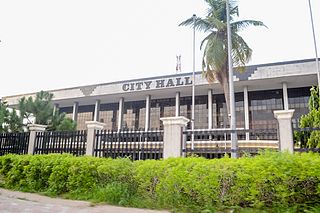 W
WThe Lagos City Hall, established in 1900, is the secretariat of the oldest local government in Nigeria. It is located within the Brazilian quarters, right in the center of the Lagos business district. It is also adjacent to King's College, Lagos, St. Nicholas Hospital, Lagos and Cathedral of the Holy Cross, Lagos.
 W
WThe CMS Grammar School in Bariga, a suburb of Lagos in Lagos State, is the oldest secondary school in Nigeria, founded on 6 June 1859 by the Church Missionary Society. For decades it was the main source of African clergymen and administrators in the Lagos Colony.
 W
WJames Pinson Labulo Davies was a 19th-century African merchant-sailor, naval officer, influential businessman, farmer, pioneer industrialist, statesman, and philanthropist who married Sara Forbes Bonetta in colonial Lagos.
 W
WFreedom Park is a memorial and leisure park area in the middle of downtown Lagos in Lagos Island, Nigeria which was formerly Her Majesty's Broad Street Prison. It was designed by the Architect Theo Lawson.
 W
WGberefu Island also known as Point of No Return is a populated historical island located in Badagry, a town and local government area of Lagos State, South-Western Nigeria. Symbolized by two poles slightly slanted towards each other and facing the Atlantic Ocean, the island was a major slave port after it was opened in 1473 during the Trans Atlantic Slave Trade era. According to Nigerian historians, as many as 10,000 slaves were believed to have been shipped to the Americas between 1518 and 1880 from the island.
 W
WSir John Hawley Glover was a Royal Navy officer who served as Governor of Lagos Colony, Governor of Newfoundland, and Governor of British Leeward Islands.
 W
WThe Government Gazette was the government gazette for the British colony of Lagos. It was published between 1887 and April 1906.
 W
WFredrick Kúmókụn Adédeji Haastrup was born in the 19th century into the family of a member of the ancient Bilaro Royal house of Iléṣa. It is one of the four ruling families of Ileṣa and has been, since the reign of Owá Ọbọkun Atakumosa 900 years ago. After his reign, accession to the throne was passed, in turn, between his four sons, a system that continues to date: accession is rotated between four ruling families in Ijéṣaland. Following Kúmókụn's reign, the Bilárọ family adopted the name Ajímọkọ Haastrup.
 W
WJohn Holt was an English merchant, who founded a shipping line operating between Liverpool and West Africa, and a number of businesses in Nigeria, which are now incorporated in John Holt plc.
 W
WIga Idunganran is the Official Residence of the Oba of Lagos, situated on Lagos Island. It is also a tourist attraction.
 W
WIlojo Bar, also called Olaiya House or Casa da Fernandez, was a Brazilian-styled historic building located near Tinubu Square in Lagos Island, Lagos State, Nigeria. It was originally built as a bar and restaurant in 1855 by the Fernandez family who employed returning ex-slaves who had mastered the art of building while in South America. Ilojo Bar was subsequently sold to Alfred Omolana Olaiya of the Olaiya family in 1933 and was declared a national monument in 1956 by the National Commission for Museums and Monuments.
 W
WKing's College, Lagos is a secondary school in Lagos, Lagos State, Nigeria. It was founded on 20 September 1909 with 10 students on its original site at Lagos Island, adjacent to Tafawa Balewa Square. The school admits only male students although historically some female HSC students were admitted before the establishment of Queen's College Lagos, popularly known as King's College's sister school. King's College conducts exams for the West African School-Leaving Certificate and the National Examinations Council.
 W
WThe Roman Catholic Archdiocese of Lagos {Lagosen(sis) in Latin} is the Metropolitan See for the Ecclesiastical province of Lagos in Nigeria.
 W
WLagos Colony was a British colonial possession centred on the port of Lagos in what is now southern Nigeria. Lagos was annexed on 6 August 1861 under the threat of force by Commander Beddingfield of HMS Prometheus who was accompanied by the Acting British Consul, William McCoskry. Oba Dosunmu of Lagos resisted the cession for 11 days while facing the threat of violence on Lagos and its people, but capitulated and signed the Lagos Treaty of Cession. Lagos was declared a colony on 5 March 1862. By 1872 Lagos was a cosmopolitan trading center with a population over 60,000. In the aftermath of prolonged wars between the mainland Yoruba states, the colony established a protectorate over most of Yorubaland between 1890 and 1897. The colony and protectorate were incorporated into Southern Nigeria in February 1906, and Lagos became the capital of the protectorate of Nigeria in January 1914. Since then, Lagos has grown to become the largest city in West Africa, with an estimated metropolitan population of over 9,000,000 as of 2011.
 W
WLagos steam tramway was a passenger and sanitary tramway that carried cargo and passengers within Lagos Colony. The tram was an important public transit system connecting travelers and merchandise from Ibadan and Abeokuta via the railway terminus at Iddo, mainland Lagos to Port of Lagos. The system ran from 1902 to 1933, it carried passengers and goods for twelve years from 1902 to 1914 and nightsoil from 1906 to 1933.
 W
WFrederick John Dealtry Lugard, 1st Baron Lugard, known as Sir Frederick Lugard between 1901 and 1928, was a British soldier, mercenary, explorer of Africa and colonial administrator. He was Governor of Hong Kong (1907–1912), the last Governor of the Southern Nigeria Protectorate (1912–1914), the first High Commissioner (1900–1906) and last Governor (1912–1914) of the Northern Nigeria Protectorate and the first Governor-General of Nigeria (1914–1919).
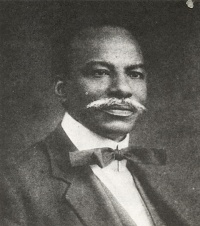 W
WOlayinka Herbert Samuel Heelas Badmus Macaulay was a Nigerian nationalist, politician, surveyor, engineer, architect, journalist, and musician and is considered by many Nigerians as the founder of Nigerian nationalism.
 W
WNorthern Nigeria was a British protectorate which lasted from 1900 until 1914 and covered the northern part of what is now Nigeria.
 W
WThe Oba (king) of Lagos is the traditional, yet ceremonial, sovereign of Lagos, a coastal settlement of Yoruba people and Nigerians that went on to become the largest city in Africa after first giving its name to Lagos State, the financial heart of contemporary Nigeria. The king has no political power, but is sought as a counsel or sponsor by Nigerian politicians who seek support from the various residents of Lagos. Among other ceremonial roles, the Oba appears in tourism advertisements on behalf of the city, often stating, "you've gotta go to Lagos”.
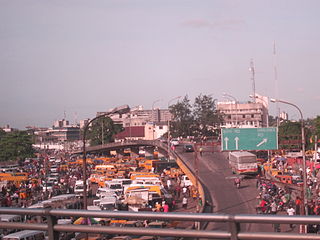 W
WObálendé, an adulteration of the Yoruba saying Ibi ti Oba le wa de, meaning "Where the kings chased us to", is a neighbourhood of Lagos, Nigeria, located in Eti-Osa LGA, close to Lagos Island. Eti-Osa was split by the Lagos state government into Local Community Development Areas (LCDA) of which Ikoyi–Obalende is one. It contains many schools, including Holy Child College Obalende, St Gregory's College, Aunty Ayo International School and Girls Secondary Grammar School. It is bordered by the police barracks and Army barracks. Obalende is extremely crowded and congested. Obalende is famous for its night life, its red-light district and for its suya with a junction popularly called Suya junction.
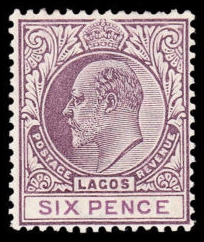 W
WThis is a survey of the postage stamps and postal history of Lagos, now part of modern Nigeria.
 W
WThe Saro, or Creoles in Nigeria during the nineteenth century and early twentieth century, were formerly enslaved people who migrated to Nigeria in the beginning of the 1830s. They were known locally as Saro, or Amaro: migrants from Brazil and Cuba.
 W
WSir Havilland Walter de Sausmarez, 1st Baronet was a judge of various British colonial or consular courts in Africa and Asia, the Ottoman Empire and China. His last judicial position before retirement was as Chief Judge of the British Supreme Court for China. He later served as Bailiff of Guernsey.
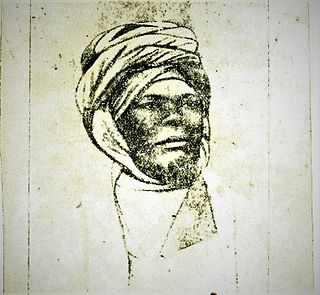 W
WChief Mohammed Shitta-Bey, alias Olowo Pupa, was the first titled Seriki Musulumi of Lagos. He was a prominent Nigerian Muslim businessman, aristocrat and philanthropist who was involved in commerce across Lagos and the Niger-Delta region. He was also a patron of the Shitta-Bey Mosque in Lagos, and served as a leader in the Lagos Muslim community until his death.
 W
WSouthern Nigeria was a British protectorate in the coastal areas of modern-day Nigeria formed in 1900 from the union of the Niger Coast Protectorate with territories chartered by the Royal Niger Company below Lokoja on the Niger River.
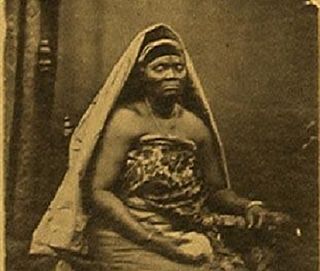 W
WMadam Efunroye Tinubu, born Efunporoye Osuntinubu, was a politically significant figure in Nigerian history because of her role as a powerful female aristocrat and slave trader in pre-colonial and colonial Nigeria. She was a major figure in Lagos during the reigns of Obas Adele, Oluwole, Akitoye, and Dosunmu.
 W
WThe Velekete Slave Market is a market located in Badagry, Lagos State. Established in 1502 and named after the Velekete deity, the market was significant during the Trans-Atlantic Slave trade in Badagry, as it served as a business point where African middlemen sold slaves to European slave merchants, thus making it one of the most populous slave markets in West Africa.